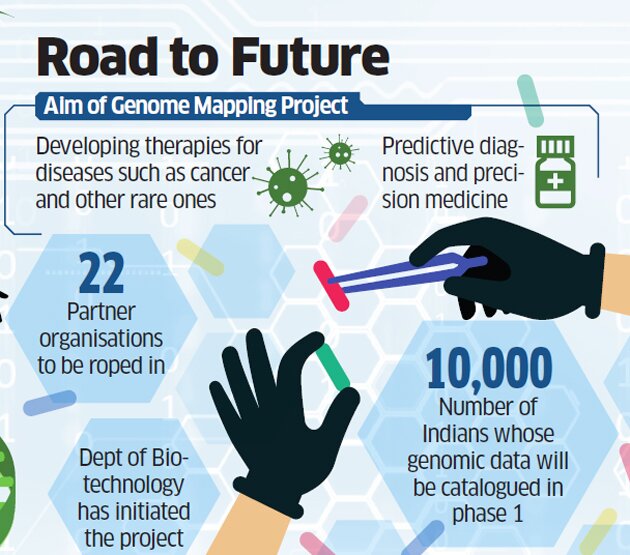Science & Technology
Genome India Initiative
- 05 Aug 2019
- 4 min read
India is planning to launch its first Human Genome Mapping project.
- Project involves scanning of 20,000 Indian genomes (in the next five years) in order to develop diagnostic tests and effective therapies for treating diseases such as cancer.
- It is to be implemented by The Department of Biotechnology (DBT), Ministry of Science and Technology.
Cancer Incidence in India
- According to the study, as India continues to age, cancer cases will double every 20 years.
- Uttar Pradesh, Bihar, Jharkhand and Odisha, will bear the biggest cancer burden in the next 10-20 years.
- According to Epidemiological Transition Level concept (ETL), number of patients with cancer started to increase as the life expectancy of Indians started to increase.
- The States with high ETL have a better development index and higher cancer rates.
- ETL is highest in Kerala and is lowest in Uttar Pradesh.
- Government should consider Bhore committee and Mudaliar committee report recommendations for cancer that include creation of a multidisciplinary cancer treatment unit in all medical colleges and setting up of a stand-alone cancer speciality hospital.
- The project is to be carried out in two phases:
- The first phase of the project involves sequencing the complete genomes of 10,000 healthy Indians.
- Second phase, involves genome sequencing of 10,000 diseased individuals.
- Data on human sequencing would be accessible to researchers through a proposed National Biological Data Centre envisaged in Biological Data Storage, Access and Sharing Policy.
- National Centre for Cell Sciences will collect samples of the microbiome from the human gut.
National Centre for Cell Science
- The National Centre for Cell Science is a national level, biotechnology, tissue engineering and tissue banking research center located at Savitribai Phule Pune University, Maharashtra.
- It is one of the premier research centers in India, which works on cell-culture, cell-repository, immunology, chromatin-remodelling.
Significance
- Healthcare: For new advancements in medical science (like predictive diagnosis and precision medicine, genomic information) and in disease management, genome sequencing can play a crucial role.
- Through genome sequencing methodology, researchers and clinicians can easily detect the disease related to genetic disorder.
- Genetic Screening: The genome project will lead to improved techniques of genetic screening for diseases prior to the birth.
- Evolution Puzzle: The genome project may answer questions regarding evolution by comparing human DNA with primate DNA.
Concerns
- Discrimination: Discrimination based on genotype is a possible consequence of genome sequencing.For example, employers may obtain genetic information on employees prior to hiring them. If a certain employee is shown to be genetically susceptible to undesirable workforce traits they may be discriminated against their genotype.
- Ownership and Control: Apart from the issue of privacy and confidentiality, questions of ownership and control of genetic information becomes critical.
- Fair Use of Genetic Data: For insurance, employment, criminal justice, education, adoption, and military is necessary.





